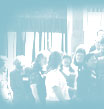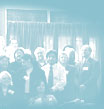
Bahá'í
Worship
In addition to their own personal devotions,
Bahá'ís also gather together for worship. Many
communities organize early morning prayers. There is no set
ritual to Bahá'í worship; therefore prayers are
either chosen individually or selected by the host. Bahá’ís
are also encouraged to join with followers of other faiths in
worshipping God and actively promote inter-faith activities.
Bahá'í Houses of Worship are open to people of
all faiths and traditions to join together in praise of God.
|
 |

BAHÁ’Í
COMMUNITIES differ greatly around the world. Some are large, some
small, some are new, some have existed since the time of Bahá'u'lláh.
Bahá’í communities everywhere unite people who would
otherwise not mix together. Young and old, black and white, rich
and poor learn to love and appreciate each other as members of
the same human family. This is the distinctive feature of all
Bahá'í communities - they are united. Bahá'ís
do not live together as a separate community, but live and work
in the wider society, which they try to serve to the best of their
abilities.
When they can, Bahá’ís meet together regularly,
usually in each other's homes or sometimes in local Bahá'í
centres. They may meet for prayers, to plan teaching activities
or service projects, to study together, to hold children's classes
or just to socialize. Many Bahá’ís hold informal
meetings in their homes, to which they invite their friends and
neighbors, to share the teachings of Bahá'u'lláh.
These meetings are sometimes called 'Firesides'.
The
Nineteen Day Feast
The
foundation of Bahá'í community life is the Feast,
which is held on the first day of every Bahá'í
month. The Nineteen Day Feast is the heartbeat of the Bahá'í
community. Attendance is not obligatory, but all Bahá’ís
should regard it their sacred duty to attend. At the Feast Bahá’ís
pray, consult and meet in loving fellowship.
The Feast consists of three parts: It begins with a devotional
program of prayers and readings, which may include music and
singing. This is followed by a period of consultation when the
Local Spiritual Assembly reports to the members of the community
and receives suggestions and ideas. Everyone, including children,
takes part. During the last part of the Feast, refreshments
are served and entertainment may be provided. It is a time to
renew friendships and exchange news and stories.
All three parts of the Feast are regarded as equally spiritual
in content. It is a gathering especially for Bahá'ís
- a time for spiritual renewal, where all Bahá'ís
can experience the love and support of their community. The
spirit of hospitality is more important to Bahá’ís
than the material food or surroundings, and the Feast should
always be a happy occasion where everyone feels welcome.
  read
more read
more
 |







